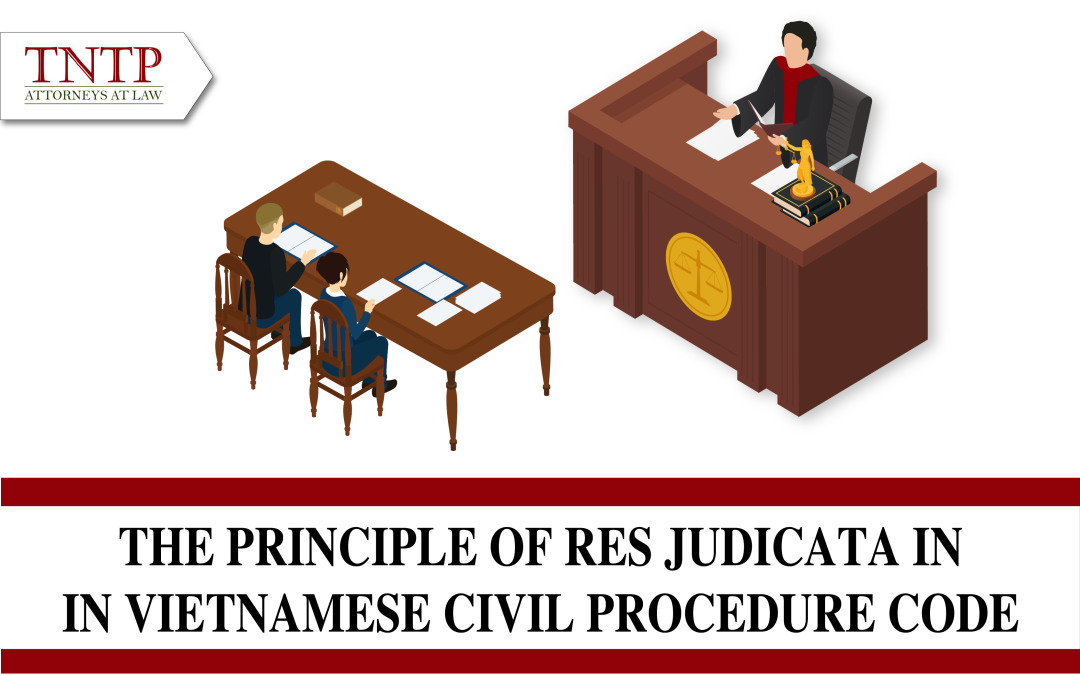Latin is widely used in many legal systems worldwide due to historical and political factors and its precision in defining legal concepts. In Vietnam, many Latin terms have been incorporated into articles of various legislative documents. In this article, TNTP will analyze the principal of Res Judicata – one of the important principles used in Vietnamese Civil Procedure Law.
1. Concept of Res Judicata
In Latin, Res Judicata means “a judged matter”. It is a legal principle indicates that once a judgment about a matters is final, parties involved in that lawsuit cannot pursue the same claim again. This principle ensures fairness, prevents the parties from filing their lawsuit again to alter the final judgment and avoids unnecessary to prolongation of the cases.
Overall, the principle of Res Judicata indicates that once an issue has been fully resolved based on its core nature, retrial becomes unnecessary, as if the issue remains unchanged, the core nature remains the same as well.
2. The Principle of Res Judicata in Vietnamese Law
Vietnamese law has also incorporated the principle of the Res Judicata, codify specific provisions in civil procedure law, including:
• Article 192 of the Civil Procedure Code 2015
According to Point c, Clause 1, Article 192 of the 2015 Civil Procedure Code, the judge has the right to return the petition in the if the matter in the petition has been resolved by a judgment or decision that has come into legal effect of the Court or a decision that has come into legal effect of a competent state agency. Therefore, it sets an obligation for the judge for a check on whether the matter has been resolved or not.
• Article 218 of the Civil Procedure Code 2015
According to Clause 1, Article 218 of the Civil Procedure Code 2015 regarding the consequences of terminating civil case resolution, when a decision to suspend the resolution is made, the parties can not file a lawsuit requesting the court to resolve that same civil case again if the subsequent case does not differ from the previous one in terms of plaintiffs, defendants, and disputed legal relationships – except in certain cases where the law specifically allows for refiling.
• Article 472 of the Civil Procedure Code 2015
According to point d Clause 1, Article 472 of the Civil Procedure Code 2015, Vietnamese courts must return petitions/requests or terminate proceedings in case involving foreign elements when there is a competent foreign court judgment/decision, or and arbitral award, or other competent foreign authority that has already resolved the matter.
These provisions demonstrate that Vietnamese law has actively incorporated international legal standards while adapting them appropriately to its political and social framework. The application of Res Judicata in Vietnamese law brings significant value and ensures social order and fairness.
3. Purposes of Applying Res Judicata in Vietnamese Law
• Ensuring the Execution of Judgments
To guarantee the rights of the winning party, it is essential to move to the judgement enforcement stage. The court’s declaration of ending the trial phase ensures the judgement can be enforced without delay or interruption. Therefore, Res Judicata is necessary to ensure the case is “finalized” at the trial stage, facilitating a quick judgment enforcement and protecting the rights of the enforced party.
• Saving Costs, Time, and State Resources
Repeated trials for a single case burden the state with significant costs, time, and resources. Thus, applying Res Judicata is reasonable to ensure these resources are used effectively. Once a case is conclusively resolved, the state can allocate these resources to address other matters.
• Ensuring Stability and Maintaining Social Order
If the Court resolves a disputes, and the parties keeps making the same claims for the Court, the Court can be depicted by social as “Ineffective” and even considered “unable to bring justice”, which can seriously affecting social stability and order. Res Judicata will help the court to resolves the dispute in a definitive manner, therefore avoiding the continuous re-trial proceeding, and maintaining the stability and social order.
This article by TNTP discusses “The Res Judicata Principle in Vietnamese Civil Procedure Code”. We hope that this provides value to our readers.
Yours sincerely,








